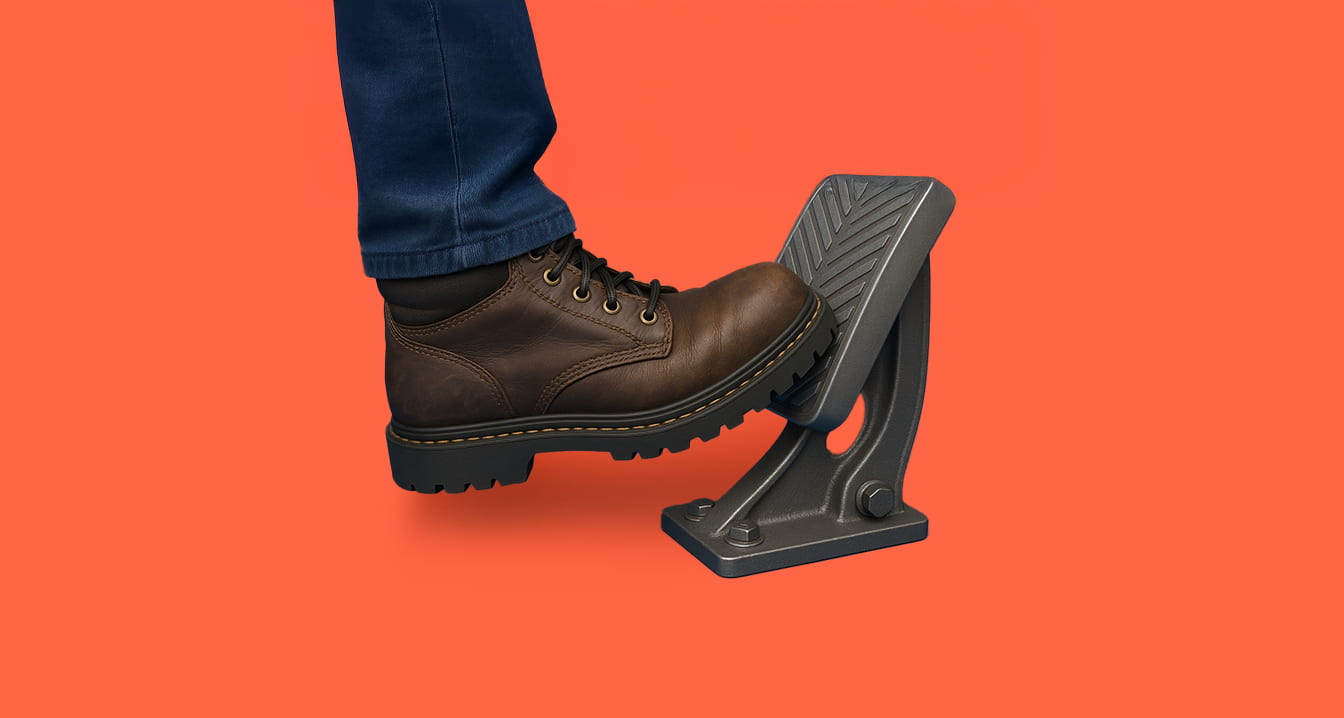Imagine a heavy truck descending quickly on a winding mountain road, and its driver needs Standing up suddenly!
At this moment, the right thing to do is to use brakes that work absolutely efficiently. The question here is, how do you ensure the truck's brakes are efficient?
Ensuring the safety of the brakes of heavy trucks means ensuring that your journey is safe, especially with harsh road or weather conditions. We make sure that brake maintenance is not just a routine procedure, but a matter of life and death.
You can consider this article as a comprehensive guide that shows you the most fatal mistakes made by most drivers and smart steps to ensure the efficiency of the truck brakes.
The risks of neglecting brakes in heavy vehicles
When it comes to heavy trucks, the risks of neglecting to maintain the truck's brakes are great, and the loss of life and property is significant.
Some statistics reveal that 30% of fatal truck accidents are caused by brake failure, and 60% of these accidents could have been prevented by regular maintenance. This means that the cost of neglecting the brakes is not only measured in money, but in lives.
It is worth noting that brake problems do not appear suddenly, but accumulate gradually, starting with hearing a slight creak when braking, then increasing stopping distance, and even being unable to fully control the brakes at the worst possible moment.
What does the brake system in trucks consist of?
The brake system in trucks consists of the following main components:

- brake pads and shoes
It is the key element in the braking process. It is made of high-quality and heat-resistant friction materials. It is available in different types to suit the nature of use andclimatic conditions.
- brake discs and discs
It works with the pads to generate the required braking force. It has special designs to improve heat dissipation. It also needs periodic inspection to detect any cracks or corrosion in them.
- Power transmission lines
It includes durable hoses and tubes, which are specifically designed to transport brake fluid or compressed air, and should also be inspected regularly to detect any leaks or damage.
- Air driving systems
Air brakes are the most common in heavy trucks. They rely on an air compressor to generate the power needed for braking, and require constant monitoring of pressure levels.
- Modern security systems
It includes an anti-lock braking system to prevent wheel skidding, an electronic control system “ABS” to improve braking efficiency, and stabilization systems on slopes.
All of these components need regular maintenance in accordance with the manufacturer's instructions, as any defect in any part of them may affect the performance of the system as a whole and endanger your safety.
The truck brake system relies on components such as pads, discs, and air systems, each part of which requires careful maintenance to ensure safety on the road.
A brief overview of the types of brakes in trucks
The types of brakes on trucks vary depending on the size of the truck andIts cargo The requirements for their operation. The following is an overview of these types:
“Air Brakes”
It is the perfect choice for heavy trucks and trailers, as it relies on air pressure to operate the brakes. It features an automatic safety mechanism when pressure drops. It also provides a high braking force suitable for heavy loads.
hydraulic brake system
The perfect choice for small and medium trucks. It works with brake fluid to transfer braking force. It is characterized by simple design and easy maintenance, but is less efficient with very heavy loads.
electric brake system
The perfect choice for modern trailers, as they operate with accurate electrical signals, provide smoother control and are less affected by weather factors.
Manufacturers choose the optimal brake system based on several factors, including: vehicle weight, operating conditions, and maintenance cost.
With the development of technology, some modern trucks have begun to combine these systems or some of them to achieve the highest levels of safety and efficiency.
7 steps to ensure your heavy truck's brakes are efficient and safe on the road
Now, we have to learn about the most important steps that help you maintain the efficiency of the brakes of heavy trucks and avoid sudden failures. You can follow the recommendations of experts as follows:
- Regular periodic examination
It includes checking the brake fluid, checking its level and quality, and replacing it in the event of a change in its color, the appearance of impurities, or a drop in its level below the “minimum” mark, or according to the recommended time periods.
You should also check the brake tubes, look for any cracks or leaks that may affect oil pressure, and check the wheel cylinders and the master cylinder to make sure there is no leakage or wear.
- Monitor the wear of the brake pads
Replace the pads when they reach the minimum thickness recommended by the manufacturer, and avoid aggressive driving that increases brake wear.
- Test your brakes regularly
It is important to test the brakes before each trip to make sure they are efficient. If you notice a delay in their response or an abnormal creaking sound, they should be checked immediately by a specialist technician.
- Maintaining the suspension system and tires
Did you know that truck tires Imbalanced or worn affect brake efficiency? You should take note of this and make sure to have the right air pressure in each tire as recommended by the manufacturer.
- Using truck brakes properly
This includes not relying entirely on it on long slopes, using a “retarder” cruise control to reduce the load on it, as well as using the “progressive braking technique instead of suddenly applying the brakes.”
- Pay attention to the danger signs
It is important to pay attention to the danger signs that warn of a malfunction and the need to quickly check the truck's brakes, including: the brake warning lamp on the dashboard, the high temperature of the brakes, the smell of burning, or the vibration of the steering wheel when the brakes are applied.
- Preventive maintenance in a specialized workshop
One of the basic steps recommended by experts to ensure the efficiency of the brake system in trucks is to show them to a specialized technician periodically to fully examine the system.
These seven steps will ensure the efficiency of the truck's brakes and avoid accidents caused by brake failures. Therefore, we recommend that you always be proactive in terms of maintenance, do not wait until the problem occurs, and remember that every journey begins and ends with healthy brakes.
Checking the brake fluid, monitoring the pads, and testing the performance before the trip are essential steps to ensure brake efficiency in heavy trucks and avoid sudden failures.
When is it necessary to change the truck brakes?
Here we'll take a quick look at when it's time to check or change a truck's brakes, as it's dangerous to neglect it:
- Noises while using the brakes
When you press the brakes, you hear a creaking or grinding sound, which indicates that the end of the life of the brakes is approaching and the need to replace them immediately.
This sound indicates wear and direct contact of the brake pad with the rotor disc. Neglect to maintain it leads to damage to components and significantly increase repair costs.
- The truck vibrates when the brakes are applied
When you feel abnormal vibrations while using the brakes, it means an alarm that calls for an urgent examination.
The main cause of these vibrations is the warping of the brake discs due to excessive heat, or the wear of the pads completely, which causes metal to rub against the metal.
- soft brake pedal
If the brake pedal is soft or has a spongy feel, it foreshadows a serious problem with the braking system.
This problem is most often caused by air leakage in the pipes or a lack of brake fluid.
This defect reduces the system's ability to generate the hydraulic pressure needed for a safe stop.
If this sign is ignored, you may completely lose control of the truck while driving, so an urgent inspection by a specialist technician is required to avoid catastrophic accidents.
- The truck swerves to one side when the brakes are applied
This defect is often caused by uneven wear on the brake pads. One side is damaged faster than the other. This leads to a difference in braking force between the two ends, causing the truck to swerve towards one side when the brakes are applied.
If your truck deviates to a specific direction when braking, it means that the brakes on the opposite side are weaker. For example, if the truck turns to the left when the brakes are applied, the problem is mostly in the brakes on the right side and may need maintenance or replacement.
- Low brake effectiveness
If you notice that your truck needs a longer stopping distance or that braking has become weaker, this is a clear warning of the need to maintain the brakes. The main reasons for this include:
- brake pads wear.
- Overheating due to excessive use or prolonged braking, especially in mountainous areas.
- Pollution and combustion caused by dirt or damage.
When should the truck brakes be changed?
The answer to this question depends on multiple factors, the most important of which are:
- The type of brake. Electric brakes have a longer operating life compared to traditional hydraulic brakes. This is due to reducing the problem of wear caused by excessive heat. The electric braking mechanism reduces direct friction, thus reducing heat generation, which preserves system components and extends their life.
- Driving patterns and operating conditions. This includes: frequent pulling of heavy loads, intensive driving in mountainous areas and slopes, and heavy loads. This causes increased pressure on the brake system, thus increasing the temperature of brake components repeatedly, faster wear of pads and discs, thus reducing the life span of the entire system.
- Regular maintenance is the secret to extending the life of brakes. It detects early wear problems, identify any damage in components, and determine whether there is a need to replace parts before the problem worsens.
- Periodic adjustments and adjustments also contribute to maintaining the balance of the brake system, ensuring an even distribution of braking force and preventing uneven wear of components.
- In general, the working time of heavy truck brakes is between 50,000 to 110,000 kilometers. Experts also advise you to check the truck brakes every 10,000 km, replace hydraulic fluids according to the manufacturer's recommendations, and ensure that the manual brakes are adjusted correctly.
When to change a truck's brakes depends on the type of system and operating conditions, but checking every 10,000 km and replacing worn components early is what ensures safe performance and longer brake life.
The most common mistakes in the maintenance of heavy truck brakes
One of the most common mistakes in the maintenance of heavy truck brakes is the use of non-original spare parts in order to save costs. This inevitably leads to rapid wear of pads and discs, 40% faster, reduced braking capacity by 25-30%, as well as material incompatibility with the original brake system.
According to the “FMCSA” report in 2022, 28% of truck accidents related to brakes were caused by non-conforming spare parts, so you should buy from certified suppliers only and check the “ISO 9001” quality certificate.
The second mistake is the imbalance of brake adjustment between the axles, which leads to truck deflection, which is a major cause of 17% of truck overturning according to “IIHS” statistics, as well as uneven brake wear that reduces its life by 35%.







